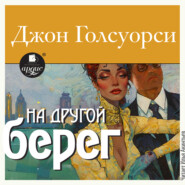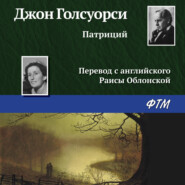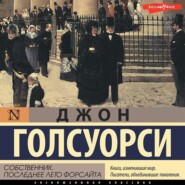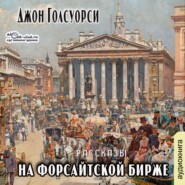По всем вопросам обращайтесь на: info@litportal.ru
(©) 2003-2024.
✖
The Forsyte Saga, Volume I. The Man Of Property
Настройки чтения
Размер шрифта
Высота строк
Поля
The letter was like the boy. He had always been an amiable chap. Old Jolyon had sent this reply:
‘MY DEAR JO,
‘The sum (L500) stands in my books for the benefit of your boy, under the name of Jolyon Forsyte, and will be duly-credited with interest at 5 per cent. I hope that you are doing well. My health remains good at present.
‘With love, I am,
‘Your affectionate Father,
‘JOLYON FORSYTE.’
And every year on the 1st of January he had added a hundred and the interest. The sum was mounting up – next New Year’s Day it would be fifteen hundred and odd pounds! And it is difficult to say how much satisfaction he had got out of that yearly transaction. But the correspondence had ended.
In spite of his love for his son, in spite of an instinct, partly constitutional, partly the result, as in thousands of his class, of the continual handling and watching of affairs, prompting him to judge conduct by results rather than by principle, there was at the bottom of his heart a sort of uneasiness. His son ought, under the circumstances, to have gone to the dogs; that law was laid down in all the novels, sermons, and plays he had ever read, heard, or witnessed.
After receiving the cheque back there seemed to him to be something wrong somewhere. Why had his son not gone to the dogs? But, then, who could tell?
He had heard, of course – in fact, he had made it his business to find out – that Jo lived in St. John’s Wood, that he had a little house in Wistaria Avenue with a garden, and took his wife about with him into society – a queer sort of society, no doubt – and that they had two children – the little chap they called Jolly (considering the circumstances the name struck him as cynical, and old Jolyon both feared and disliked cynicism), and a girl called Holly, born since the marriage. Who could tell what his son’s circumstances really were? He had capitalized the income he had inherited from his mother’s father and joined Lloyd’s as an underwriter; he painted pictures, too – water-colours. Old Jolyon knew this, for he had surreptitiously bought them from time to time, after chancing to see his son’s name signed at the bottom of a representation of the river Thames in a dealer’s window. He thought them bad, and did not hang them because of the signature; he kept them locked up in a drawer.
In the great opera-house a terrible yearning came on him to see his son. He remembered the days when he had been wont to slide him, in a brown holland suit, to and fro under the arch of his legs; the times when he ran beside the boy’s pony, teaching him to ride; the day he first took him to school. He had been a loving, lovable little chap! After he went to Eton he had acquired, perhaps, a little too much of that desirable manner which old Jolyon knew was only to be obtained at such places and at great expense; but he had always been companionable. Always a companion, even after Cambridge – a little far off, perhaps, owing to the advantages he had received. Old Jolyon’s feeling towards our public schools and ‘Varsities never wavered, and he retained touchingly his attitude of admiration and mistrust towards a system appropriate to the highest in the land, of which he had not himself been privileged to partake… Now that June had gone and left, or as good as left him, it would have been a comfort to see his son again. Guilty of this treason to his family, his principles, his class, old Jolyon fixed his eyes on the singer. A poor thing – a wretched poor thing! And the Florian a perfect stick!
It was over. They were easily pleased nowadays!
In the crowded street he snapped up a cab under the very nose of a stout and much younger gentleman, who had already assumed it to be his own. His route lay through Pall Mall, and at the corner, instead of going through the Green Park, the cabman turned to drive up St. James’s Street. Old Jolyon put his hand through the trap (he could not bear being taken out of his way); in turning, however, he found himself opposite the ‘Hotch Potch,’ and the yearning that had been secretly with him the whole evening prevailed. He called to the driver to stop. He would go in and ask if Jo still belonged there.
He went in. The hall looked exactly as it did when he used to dine there with Jack Herring, and they had the best cook in London; and he looked round with the shrewd, straight glance that had caused him all his life to be better served than most men.
“Mr. Jolyon Forsyte still a member here?”
“Yes, sir; in the Club now, sir. What name?”
Old Jolyon was taken aback.
“His father,” he said.
And having spoken, he took his stand, back to the fireplace.
Young Jolyon, on the point of leaving the Club, had put on his hat, and was in the act of crossing the hall, as the porter met him. He was no longer young, with hair going grey, and face – a narrower replica of his father’s, with the same large drooping moustache – decidedly worn. He turned pale. This meeting was terrible after all those years, for nothing in the world was so terrible as a scene. They met and crossed hands without a word. Then, with a quaver in his voice, the father said:
“How are you, my boy?”
The son answered:
“How are you, Dad?”
Old Jolyon’s hand trembled in its thin lavender glove.
“If you’re going my way,” he said, “I can give you a lift.”
And as though in the habit of taking each other home every night they went out and stepped into the cab.
To old Jolyon it seemed that his son had grown. ‘More of a man altogether,’ was his comment. Over the natural amiability of that son’s face had come a rather sardonic mask, as though he had found in the circumstances of his life the necessity for armour. The features were certainly those of a Forsyte, but the expression was more the introspective look of a student or philosopher. He had no doubt been obliged to look into himself a good deal in the course of those fifteen years.
To young Jolyon the first sight of his father was undoubtedly a shock – he looked so worn and old. But in the cab he seemed hardly to have changed, still having the calm look so well remembered, still being upright and keen-eyed.
“You look well, Dad.”
“Middling,” old Jolyon answered.
He was the prey of an anxiety that he found he must put into words. Having got his son back like this, he felt he must know what was his financial position.
“Jo,” he said, “I should like to hear what sort of water you’re in. I suppose you’re in debt?”
He put it this way that his son might find it easier to confess.
Young Jolyon answered in his ironical voice:
“No! I’m not in debt!”
Old Jolyon saw that he was angry, and touched his hand. He had run a risk. It was worth it, however, and Jo had never been sulky with him. They drove on, without speaking again, to Stanhope Gate. Old Jolyon invited him in, but young Jolyon shook his head.
“June’s not here,” said his father hastily: “went of to-day on a visit. I suppose you know that she’s engaged to be married?”
“Already?” murmured young Jolyon’.
Old Jolyon stepped out, and, in paying the cab fare, for the first time in his life gave the driver a sovereign in mistake for a shilling.
Placing the coin in his mouth, the cabman whipped his horse secretly on the underneath and hurried away.
Old Jolyon turned the key softly in the lock, pushed open the door, and beckoned. His son saw him gravely hanging up his coat, with an expression on his face like that of a boy who intends to steal cherries.
The door of the dining-room was open, the gas turned low; a spirit-urn hissed on a tea-tray, and close to it a cynical looking cat had fallen asleep on the dining-table. Old Jolyon ‘shoo’d’ her off at once. The incident was a relief to his feelings; he rattled his opera hat behind the animal.
“She’s got fleas,” he said, following her out of the room. Through the door in the hall leading to the basement he called “Hssst!” several times, as though assisting the cat’s departure, till by some strange coincidence the butler appeared below.
“You can go to bed, Parfitt,” said old Jolyon. “I will lock up and put out.”
When he again entered the dining-room the cat unfortunately preceded him, with her tail in the air, proclaiming that she had seen through this manouevre for suppressing the butler from the first…
A fatality had dogged old Jolyon’s domestic stratagems all his life.
Young Jolyon could not help smiling. He was very well versed in irony, and everything that evening seemed to him ironical. The episode of the cat; the announcement of his own daughter’s engagement. So he had no more part or parcel in her than he had in the Puss! And the poetical justice of this appealed to him.
“What is June like now?” he asked.
“She’s a little thing,” returned old Jolyon; “they say she’s like me, but that’s their folly. She’s more like your mother – the same eyes and hair.”
“Ah! and she is pretty?”
‘MY DEAR JO,
‘The sum (L500) stands in my books for the benefit of your boy, under the name of Jolyon Forsyte, and will be duly-credited with interest at 5 per cent. I hope that you are doing well. My health remains good at present.
‘With love, I am,
‘Your affectionate Father,
‘JOLYON FORSYTE.’
And every year on the 1st of January he had added a hundred and the interest. The sum was mounting up – next New Year’s Day it would be fifteen hundred and odd pounds! And it is difficult to say how much satisfaction he had got out of that yearly transaction. But the correspondence had ended.
In spite of his love for his son, in spite of an instinct, partly constitutional, partly the result, as in thousands of his class, of the continual handling and watching of affairs, prompting him to judge conduct by results rather than by principle, there was at the bottom of his heart a sort of uneasiness. His son ought, under the circumstances, to have gone to the dogs; that law was laid down in all the novels, sermons, and plays he had ever read, heard, or witnessed.
After receiving the cheque back there seemed to him to be something wrong somewhere. Why had his son not gone to the dogs? But, then, who could tell?
He had heard, of course – in fact, he had made it his business to find out – that Jo lived in St. John’s Wood, that he had a little house in Wistaria Avenue with a garden, and took his wife about with him into society – a queer sort of society, no doubt – and that they had two children – the little chap they called Jolly (considering the circumstances the name struck him as cynical, and old Jolyon both feared and disliked cynicism), and a girl called Holly, born since the marriage. Who could tell what his son’s circumstances really were? He had capitalized the income he had inherited from his mother’s father and joined Lloyd’s as an underwriter; he painted pictures, too – water-colours. Old Jolyon knew this, for he had surreptitiously bought them from time to time, after chancing to see his son’s name signed at the bottom of a representation of the river Thames in a dealer’s window. He thought them bad, and did not hang them because of the signature; he kept them locked up in a drawer.
In the great opera-house a terrible yearning came on him to see his son. He remembered the days when he had been wont to slide him, in a brown holland suit, to and fro under the arch of his legs; the times when he ran beside the boy’s pony, teaching him to ride; the day he first took him to school. He had been a loving, lovable little chap! After he went to Eton he had acquired, perhaps, a little too much of that desirable manner which old Jolyon knew was only to be obtained at such places and at great expense; but he had always been companionable. Always a companion, even after Cambridge – a little far off, perhaps, owing to the advantages he had received. Old Jolyon’s feeling towards our public schools and ‘Varsities never wavered, and he retained touchingly his attitude of admiration and mistrust towards a system appropriate to the highest in the land, of which he had not himself been privileged to partake… Now that June had gone and left, or as good as left him, it would have been a comfort to see his son again. Guilty of this treason to his family, his principles, his class, old Jolyon fixed his eyes on the singer. A poor thing – a wretched poor thing! And the Florian a perfect stick!
It was over. They were easily pleased nowadays!
In the crowded street he snapped up a cab under the very nose of a stout and much younger gentleman, who had already assumed it to be his own. His route lay through Pall Mall, and at the corner, instead of going through the Green Park, the cabman turned to drive up St. James’s Street. Old Jolyon put his hand through the trap (he could not bear being taken out of his way); in turning, however, he found himself opposite the ‘Hotch Potch,’ and the yearning that had been secretly with him the whole evening prevailed. He called to the driver to stop. He would go in and ask if Jo still belonged there.
He went in. The hall looked exactly as it did when he used to dine there with Jack Herring, and they had the best cook in London; and he looked round with the shrewd, straight glance that had caused him all his life to be better served than most men.
“Mr. Jolyon Forsyte still a member here?”
“Yes, sir; in the Club now, sir. What name?”
Old Jolyon was taken aback.
“His father,” he said.
And having spoken, he took his stand, back to the fireplace.
Young Jolyon, on the point of leaving the Club, had put on his hat, and was in the act of crossing the hall, as the porter met him. He was no longer young, with hair going grey, and face – a narrower replica of his father’s, with the same large drooping moustache – decidedly worn. He turned pale. This meeting was terrible after all those years, for nothing in the world was so terrible as a scene. They met and crossed hands without a word. Then, with a quaver in his voice, the father said:
“How are you, my boy?”
The son answered:
“How are you, Dad?”
Old Jolyon’s hand trembled in its thin lavender glove.
“If you’re going my way,” he said, “I can give you a lift.”
And as though in the habit of taking each other home every night they went out and stepped into the cab.
To old Jolyon it seemed that his son had grown. ‘More of a man altogether,’ was his comment. Over the natural amiability of that son’s face had come a rather sardonic mask, as though he had found in the circumstances of his life the necessity for armour. The features were certainly those of a Forsyte, but the expression was more the introspective look of a student or philosopher. He had no doubt been obliged to look into himself a good deal in the course of those fifteen years.
To young Jolyon the first sight of his father was undoubtedly a shock – he looked so worn and old. But in the cab he seemed hardly to have changed, still having the calm look so well remembered, still being upright and keen-eyed.
“You look well, Dad.”
“Middling,” old Jolyon answered.
He was the prey of an anxiety that he found he must put into words. Having got his son back like this, he felt he must know what was his financial position.
“Jo,” he said, “I should like to hear what sort of water you’re in. I suppose you’re in debt?”
He put it this way that his son might find it easier to confess.
Young Jolyon answered in his ironical voice:
“No! I’m not in debt!”
Old Jolyon saw that he was angry, and touched his hand. He had run a risk. It was worth it, however, and Jo had never been sulky with him. They drove on, without speaking again, to Stanhope Gate. Old Jolyon invited him in, but young Jolyon shook his head.
“June’s not here,” said his father hastily: “went of to-day on a visit. I suppose you know that she’s engaged to be married?”
“Already?” murmured young Jolyon’.
Old Jolyon stepped out, and, in paying the cab fare, for the first time in his life gave the driver a sovereign in mistake for a shilling.
Placing the coin in his mouth, the cabman whipped his horse secretly on the underneath and hurried away.
Old Jolyon turned the key softly in the lock, pushed open the door, and beckoned. His son saw him gravely hanging up his coat, with an expression on his face like that of a boy who intends to steal cherries.
The door of the dining-room was open, the gas turned low; a spirit-urn hissed on a tea-tray, and close to it a cynical looking cat had fallen asleep on the dining-table. Old Jolyon ‘shoo’d’ her off at once. The incident was a relief to his feelings; he rattled his opera hat behind the animal.
“She’s got fleas,” he said, following her out of the room. Through the door in the hall leading to the basement he called “Hssst!” several times, as though assisting the cat’s departure, till by some strange coincidence the butler appeared below.
“You can go to bed, Parfitt,” said old Jolyon. “I will lock up and put out.”
When he again entered the dining-room the cat unfortunately preceded him, with her tail in the air, proclaiming that she had seen through this manouevre for suppressing the butler from the first…
A fatality had dogged old Jolyon’s domestic stratagems all his life.
Young Jolyon could not help smiling. He was very well versed in irony, and everything that evening seemed to him ironical. The episode of the cat; the announcement of his own daughter’s engagement. So he had no more part or parcel in her than he had in the Puss! And the poetical justice of this appealed to him.
“What is June like now?” he asked.
“She’s a little thing,” returned old Jolyon; “they say she’s like me, but that’s their folly. She’s more like your mother – the same eyes and hair.”
“Ah! and she is pretty?”

















